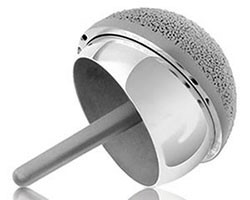Follow up of Metal on Metal Bearings
There are 2 types of replacements that may have these bearings.
- Hip resurfacing: Birmingham Hip Resurfacing BHR and others
- Standard Hip replacement with a large head metal on metal bearing

Despite the initial promise of metal-on-metal (MoM) implants as the ideal bearing surface for hip replacements and resurfacings, high short -term failure rates due to an adverse reaction to metal debris (ARMD) have led to a dramatic reduction in the number of MoM implants used in the modern era. With over one million patients worldwide having undergone hip operations utilizing a MoM bearing surface, the long-term outcomes for such patients remains unknown, and there is much debate as to the most effective management of these patients.
Although several regulatory bodies have released guidelines on the management of patients with MoM hips, these recommendations remain open to interpretation, and the most effective management for these patients remains unclear.
Surgeons should keep in mind that a decision to revise should not be based on a single investigation. Instead, the decision should take the implant type, patient symptoms, imaging findings, metal ion levels, and the activity levels of the patient into account.
There are a number of metal on metal bearings that have had a very poor record with the ASR (Johnson and Johnson De Puy) being the most well known of these poor bearings. The Birmingham metal on metal bearing has proven to be the gold standard and still has the lowest revision rate compared to all other metal on metal bearings made by other manufacturers.
If you have a metal on metal bearing then you should have closer follow with more regular visits to your orthopaedic surgeon and probably more regular tests. This is particularly important if your metal on metal bearing is not a Birmingham bearing.
As a general recommendation, I would advise the following:
Males with a Birmingham Hip Resurfacing that is well-functioning:
Follow up every 5 years with Clinical Evaluation, X-Ray and blood metal ion tests.
Females with a Birmingham Hip Resurfacing should have closer follow-up every 2 years.
Males or Females with resurfacings from poor performing implants (such as ASR) should have a yearly check with yearly blood tests (cobalt and chromion levels)
All patients with large head metal on metal Total Hip Replacements (including the Birmingham bearing) should have blood tests every 1-2 years.
A decision to revise should not be based on a single investigation. Instead, the decision should take the implant type, patient symptoms, imaging findings, metal ion levels, and the activity levels of the patient into account.
Updated April 2020
